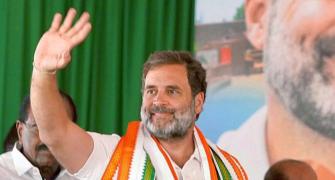The Common Minimum Programme -- the new government's blueprint on economic and certain policies -- was announced on Thursday. However, the ones who were expecting some market moving statements might have felt a little disappointed as the government more or less re-iterated what it had said since it came to power or made too broad based statements to enable someone to come to any sort of conclusion.
Nevertheless, let us have a look at some of the key statements.
Privatisation of profit-making state run firms ruled out and divestment to be undertaken on a case-to-case basis. However, these companies have complete leeway in tapping capital markets for funds as long as government retains control.
With the consolidated gross fiscal deficit of the country ruling at a poor 10 per cent of GDP for quite some time now, the erstwhile government had come up with the plan of divestment of state run firms so that the gaping hole can be plugged.
However, with the current government ruling out selling of profit making public sector units, the deficit might haunt us for a long time to come unless we greatly improve our efficiencies or mop up higher revenues.
Deficit also means spending less on key areas such as infrastructure development, thus hurting the growth prospects of the economy in the long run. It remains to be seen how the new government reconciles fiscal responsibility and developmental growth at the same time.
Tax rates to be kept stable and conducive to growth and investment and introduction of cess on all federal taxes to finance the commitment to universalise access to quality basic education. Also, Federal deficit to be eliminated by 2009 and GDP growth rate to be boosted by 7%-8% annually over this decade.
While a lot of governments in the past had promised similar kind of GDP growth rates, their actual performance left a lot to be desired.
History has it that no country has progressed without sizeable investments in infrastructure and with savings rate hovering over the 22 per cent mark and government deficit running into 10 per cent of GDP, it leaves little room for investments in infrastructure and thus stifles economic growth.
The government therefore needs to not only target higher revenues it also has to encourage FDI inflows into the country. For the former to be a reality, more sectors need to be brought under the tax net as currently the industrial sector accounts for almost 66
As far as foreign direct investment inflows are concerned, labour laws have to be made more flexible red-tapism needs to be minimised. Moreover, it will have to generate significant number of jobs and promote industrial growth as without industrialisation it will be difficult to get the transformation we want.
Review Electricity Act 2003 and help increase private power generation and distribution.
Precarious financial condition of majority of the states in the country and state electricity boards (SEBs) in particular had meant that there was a need for encouraging power generation and distribution by the private players.
With positive results flowing out of the same in terms of big-ticket greenfield projects and improved efficiencies, the current government has sought to continue with these sets of reforms.
This is likely to support the growth momentum of private power players as well as the companies, which engage in manufacturing and setting up of power equipment.
However, further clarity will emerge once the government reviews the Electricity Act 2003 and comes out with details on the same.
Aim to ease burden of high interest on farm loans and protect farmers from cheap imports.
With 70 per cent of the country's population depending on agriculture for its livelihood, no government can afford to ignore the farming community.
Accordingly, the CMP aims at easing the burden of high interest rates and at the same time protecting farmers from cheap imports. While these efforts are laudable, what is really needed is some concrete measure towards increasing the productivity in the sector.
On an average, productivity for grains like wheat, rice etc is more than double in countries like France, the United States, Argentina, and Brazil as compared to India. So there is need for much required land reforms. Without these the task of achieving 7%-8% GDP growth rate on a sustainable basis seems a little unlikely
Therefore, it becomes imperative to see what steps the government takes to improve upon this aspect.
As said earlier, most of the statements are too broad based to arrive at any conclusions.
Hence, the first budget of the current government to be tabled within the next few weeks assumes greater significance and it will be the real indicator of which way the policies of the government are headed.
Equitymaster.com is one of India's premier finance portals. The web site offers a user-friendly portfolio tracker, a weekly buy/sell recommendation service and research reports on India's top companies.







